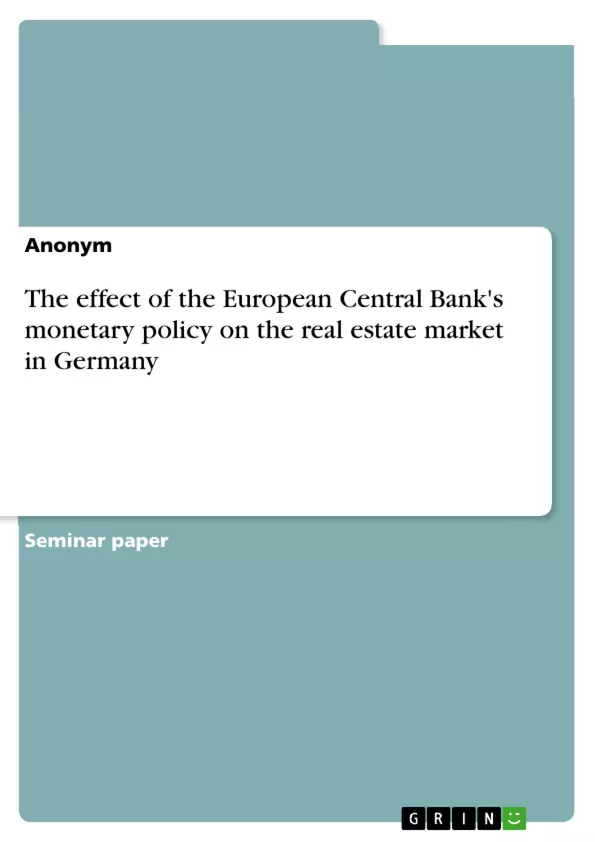This paper analyses the European monetary policy and its effects on the real estate market. The prices for real estate in Germany are continuously rising at a steady level. High sought-after cities are not only affected by the positive price trend, but far beyond that also less sought-after regions. On the other hand, the European Central Bank has been pursuing a policy of low-interest rates for years, which has been extended by various purchase programmes, especially since the financial crisis and during the current pandemic. A connection between monetary policy and the development of real estate prices can be deduced. Many interest-bearing savings products are expiring, and the low- interest rates make a new investment less attractive. Besides, Germans do not like shares or bond as an investment, the demand for flats and houses, which are seen as supposedly safe investments, has increased. The past has shown how quickly an overheated real estate market can lead to price bubbles and severely shake financial stability.
Inhaltsverzeichnis (Table of Contents)
- Introduction
- Monetary Policy
- Term discussion
- Instruments
- Expansionary monetary policy
- Contractionary monetary policy
- Approaches
- Effects of on the European real estate market
- European monetary policy
- Current policy of the European central bank
- The German real estate market
- Influence of monetary policy on real estate
- Conclusion
Zielsetzung und Themenschwerpunkte (Objectives and Key Themes)
This term paper aims to analyze the European monetary policy and its effects on the real estate market in Germany. The paper focuses on the relationship between monetary policy and real estate prices, examining how the European Central Bank's actions influence the German housing market. The paper explores the theoretical framework of monetary policy and then examines the specific instruments and approaches used by the European Central Bank.
- The role of monetary policy in economic stability
- The relationship between monetary policy and real estate prices
- The effects of low interest rates on the German housing market
- The impact of the European Central Bank's policies on German real estate investment
Zusammenfassung der Kapitel (Chapter Summaries)
The introduction provides an overview of the rising real estate prices in Germany and the European Central Bank's long-standing policy of low interest rates, suggesting a potential link between the two. The first part of the paper dives into the theoretical framework of monetary policy, defining its objectives and instruments, particularly focusing on the European Central Bank's approach.
The second part analyzes the current state of the European Central Bank's monetary policy and its potential impact on the German real estate market. This section examines the specific characteristics of the German housing market and explores how the European Central Bank's policies affect real estate investments.
Schlüsselwörter (Keywords)
The key terms and concepts explored in this term paper include monetary policy, European Central Bank, real estate market, low interest rates, housing prices, investment, and economic stability. These keywords highlight the paper's focus on understanding the relationship between monetary policy and real estate markets, particularly in the context of the German economy.
- Arbeit zitieren
- Anonym (Autor:in), 2021, The effect of the European Central Bank's monetary policy on the real estate market in Germany, München, GRIN Verlag, https://www.hausarbeiten.de/document/1137497


